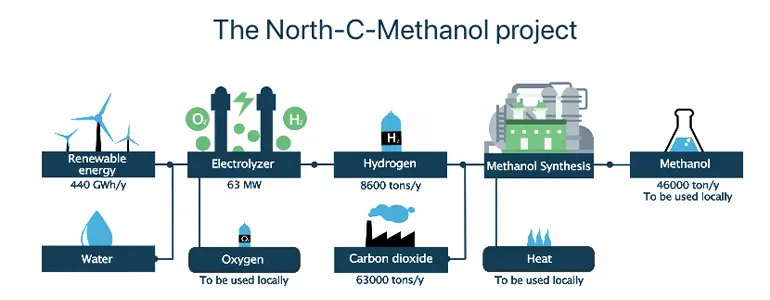North-C-Methanol: largest renewable hydrogen-to-methanol complex in the world

That the future is circular, is well understood in Flanders. In the Ghent part of the North sea Port lies the largest renewable hydrogen-to-methanol complex in the world: North-C-Methanol. Here, waste from one company forms the raw material for another company. The result is a reduction of 140,000 tons of CO2 emissions, similar to the work of 6 million trees a year, and a creation of 44,000 tons of green methanol for the local chemical and renewable energy industries and as fuel for ships and trains.
The ideas behind North-C-Methanol fit in with the ‘European Green Deal’, the European Commission’s plan to make the EU carbon-neutral by 2050.
This particular project was started two years ago by 10 private and public partners and will by 2030 have an electrolysis capacity that is no less than 6 times larger than the largest system currently operating worldwide.
The 65 megawatt electrolyser converts water into green hydrogen and oxygen via wind energy. The harvested oxygen is then used locally in the steel industry and the green hydrogen is used to convert the captured CO2 emissions from large local industrial players such as ArcelorMittal, Alco Bio Fuel and Yara into green methanol. All by-products of methanol production such as oxygen, heat and water are also reused locally. This creates a far-reaching industrial and circular integration.
Methanol is an important raw material, also for the industry in North Sea Port. Its production is however still based on fossil sources (oil and gas). Different sectors have a need for methanol, which will need to be green methanol in the future. The local chemical and renewable fuel industry in the North Sea Port now takes the produced methanol as green feedstock or fuel for ships and trains. In the chemical industry methanol is used for the production detergents, pesticides, solvents, pharmaceuticalsn, building materials (wood panels, insulation, paints, glues), textiles and food. As a fuel the green variant is more sustainable compared to fossil fuels and combustion results in lower emissions of nitrogen compounds, sulfur compounds and particulate matter.
"This project shows why we in Flanders can become a leader in sustainable innovation. With our ports and their industry, we are ideally positioned to invest in a circular and sustainable industry. It creates sustainable growth and new jobs, and with this type of project we are making a leap forward towards a resilient Flanders. Moreover, it is also a step in the direction of becoming less dependent on fossil raw materials from abroad," says Flemish Deputy Minister-President Hilde Crevits.
#FlandersNewsService
© Northccuhub